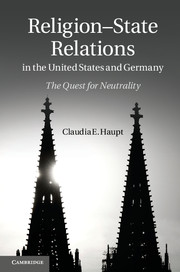Book contents
- Frontmatter
- Contents
- Acknowledgments
- Introduction
- Part I The Comparative Approach
- 1 The past and present of comparative constitutional studies
- 2 The culture wars, American exceptionalism, and a comparative analysis of religion–state relations
- 3 Employing a comparative approach
- Part II Religion–State Relations and the Role of Neutrality
- Index
- References
3 - Employing a comparative approach
from Part I - The Comparative Approach
Published online by Cambridge University Press: 05 January 2012
- Frontmatter
- Contents
- Acknowledgments
- Introduction
- Part I The Comparative Approach
- 1 The past and present of comparative constitutional studies
- 2 The culture wars, American exceptionalism, and a comparative analysis of religion–state relations
- 3 Employing a comparative approach
- Part II Religion–State Relations and the Role of Neutrality
- Index
- References
Summary
Chapter 1 concluded that comparison can be beneficial; Chapter 2 surveyed the larger societal context in which to place the comparison; this chapter establishes the parameters of the comparison itself. Before proceeding in the analysis of neutrality in religion–state relations, the mode of inquiry deserves some thought. The scope of what follows is deliberately limited: the following analysis will focus on only two countries, Germany and the United States, and only one concept, state neutrality, used in only one context, namely to describe the relationship between religion and the state in constitutional terms. The goal of limiting this study in such a manner is to capitalize on the characteristics recognized in social science as the “particular properties” of qualitative research, “depth, richness, and process tracing.”
It seems that the real challenges of the comparative constitutional endeavor have largely been obscured in the current debate over whether to engage in comparison at all. The majority of political objections outlined in Chapter 1 can be refuted, but the justified legal concerns must be addressed by careful comparative analysis. The question that remains after a survey of the current debate is: where does the comparative endeavor go from here? If the goal of comparative constitutional law is “to explain, rather than merely describe,” those engaging in constitutional comparison can learn something from the social sciences, where “validation or refutation of propositions about the world is common to all core quantitative and qualitative, ‘large-N’ and ‘small-N’, behavioralist and historical-interpretive approaches to social inquiry used in disciplines such as sociology and political science, let alone in generally more positivist disciplines such as social psychology and economics.” What follows, in short, is a small-N study of what two constitutional courts mean when they interpret the respective constitutional frameworks of religion–state relations to prescribe a posture of “neutrality.” The hypothesis may be framed as follows: “neutrality” as employed by the US Supreme Court means “less distance” between religion and state, whereas “neutrality” as employed by the German Federal Constitutional Court means “more distance” between religion and state. Starting from opposite ends of the church–state spectrum it appears that both courts are moving toward neutrality in their interpretory practice. “More” and “less” distance is measured in historical perspective against the previously established distance between religion and state in each country’s constitutional jurisprudence. Thus, there appears to be a trend of convergence while the trajectories of development underlying this trend point in the opposite direction.
- Type
- Chapter
- Information
- Religion-State Relations in the United States and GermanyThe Quest for Neutrality, pp. 64 - 76Publisher: Cambridge University PressPrint publication year: 2011



